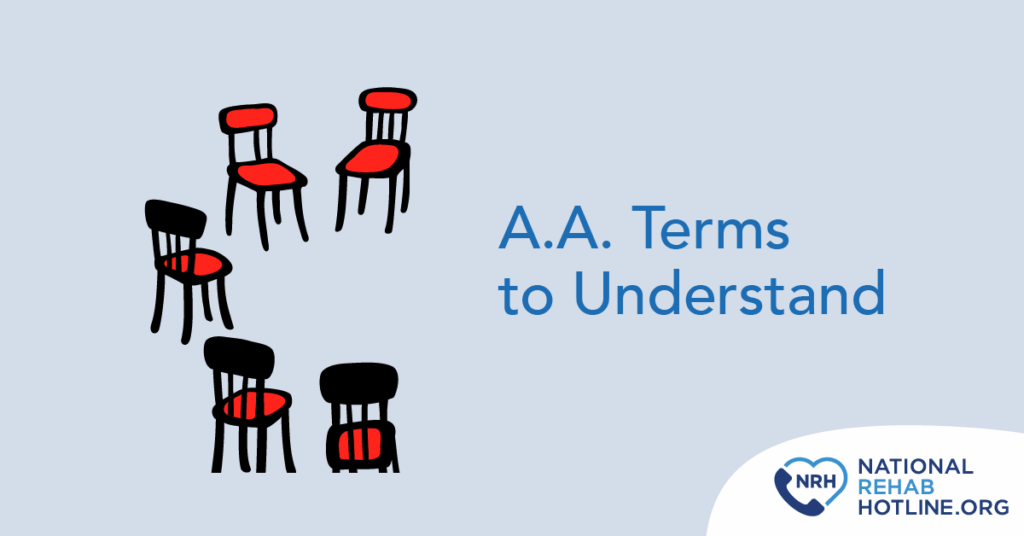Approximately 2.3 million people in the United States over age 12 sought treatment in 2023 for problems related to alcohol use, according to the National Institute on Alcohol Abuse and Alcoholism. Participation in a 12-step program is often part of this treatment.
Joining a 12-step program such as Alcoholics Anonymous can sometimes feel like being introduced to an entirely new language. Participants use AA sayings and short AA quotes as a shorthand to get relevant concepts across. If you’re new to 12-step programs, this guide to AA words and phrases could help you get your bearings.
Common Terminology in 12-Step Culture
One of the first sets of words you might encounter in 12-step culture relates to the meetings themselves. Meetings might be advertised as:
- Closed. A closed meeting is typically only open to active participants.
- Open. Friends and family can attend an open meeting. Members of the general public, including local media, may also be permitted to observe the meeting.
Language involving the 12-step program also comes up quickly when discussing recovery programs. Common terms revolving around 12-step culture include:
- 12 Steps. The 12 Steps of AA culture are the principles developed by the founders of AA, Bill Wilson and Dr. Robert Holbrook Smith, that most 12-step programs follow. They build upon each other as the participant progresses through the stages of recovery.
- 12 Concepts. The 12 Concepts of AA are the rules that AA administration follows and the responsibilities of people running AA meetings.
- 12 Traditions. This lists the guiding principles AA members are expected to follow. They include focusing on the common welfare of members and remaining nonprofessional and autonomous.
- Three Legacies. These are Recovery, Unity and Service and are part of the overall culture of AA.
AA Sayings: Language from the Big Book
You might hear references to the “Big Book” in an AA meeting, along with other specific words and phrases related to this book. Here’s a quick glossary of Big Book concepts.
- The Big Book. This term references the original book published in 1939 that laid out the core principles of AA. The book was published with large type on thick paper to make it look bigger, thus the tongue-in-cheek name.
- Recovery. This is the process of breaking free from alcohol abuse and addiction. Those participating in 12-step programs are in the process of recovery.
- Addict. Someone who’s dependent on alcohol or drugs is an addict. An individual can be an addict even after completing a 12-step program, and recovery is considered a lifelong process to prevent relapses.
- Relapse. Relapse occurs when someone who’s stopped using alcohol or drugs starts using the problem substance again. It can also include returning to problematic life behaviors tied to addiction.
- Fellowship. Members of a 12-step program belong to a fellowship, a group with a common shared experience of recovery.
- Detox. The detox process is part of recovery and involves the initial period when the person completely stops drinking. A detox center is a place where an individual undergoes detox under medical supervision.
- Denial. This is a phase many alcoholics go through when they refuse to admit they’re addicted.
- Acceptance. This is the process in which an individual accepts that addiction is a problem for them and they need help to recover.
- Rehab. Short for “rehabilitation program” or “rehabilitation center,” rehab is a formal program of recovery that takes place in a specialized facility.
- Sponsor. A sponsor in a 12-step program is an experienced member who acts as a mentor to a newcomer. Everyone entering an AA 12-step program is usually assigned a sponsor.
- Birthday. The anniversary of a member’s first day of sobriety is often referred to as their birthday.
Cliches, Complex Phrases and Misunderstood Terms
Members who’ve participated in a 12-step program for a while may use terms that are universally understood among group members but tend to confuse outsiders. They include:
- Cliches. These are common sayings repeated during meetings or in written materials provided to members that may seem basic and uninspired but often offer a sense of deeper truth to some members. These might include sayings such as “hang in there” or “let go and let God.”
- Twelve & Twelve. This is a common way to refer to the Twelve Traditions and Twelve Steps in one convenient phrase.
- The Serenity Prayer. Found in the Big Book, this prayer is often recited at the start of AA meetings.
- 13th Step. This phrase references intimate relationships formed between an existing member of an AA group and a newcomer to the group. Because those beginning their sobriety journey are often fragile and vulnerable, these relationships are considered taboo as they undermine the purpose of the group and may affect the new member’s recovery.
- Terminally unique. This refers to people who think they’re unique and can skip part of the 12 steps during recovery. The program emphasizes that all 12 steps are required.
- Geographical cure. This is the belief that someone can move to a different location and that will solve their addiction. AA principles don’t support this belief.
- Crosstalk. Responding directly to other meeting participants sharing personal stories during the meeting is called crosstalk, and it’s generally prohibited during meetings.
- Higher power. This term, mentioned in a 12-step program context, often refers to God, but alternative interpretations are available for 12-step participants who don’t believe in God.
How Knowing the Lingo Supports Recovery
Knowing the lingo of AA 12-step programs helps you integrate more easily into a recovery program and bond with other members. Generally, members are welcoming, helpful and willing to explain any terms you don’t understand. If you’re interested in learning more about entering a recovery program and want to speak to someone about how to start your recovery journey, reach out to the National Rehab Hotline for help.

